Mike Pompeo hurried to call and reinsure European allies on Friday. The US Secretary of State apparently tried to calm the situation with his call diplomacy after the spectacular killing of Qass Soleimani, the 62-year-old commander of the Iranian Quds Brigades, by a US missile attack a few hours earlier.
Pompeo assured the German Foreign Minister Heiko Maas that the USA remained "committed to de-escalation". Hardly anyone in political Berlin wanted to follow this interpretation of the situation this Friday - the further course seems too imponderable.
The federal government officially called for moderation. Not surprisingly, this is the line that the federal government has always followed in the conflict with Iran.
- "It is precisely at this point that de-escalation is now important," was the central message from Deputy Government Spokeswoman Ulrike Demmer on Friday. However, she also found that the US action was a reaction to a number of provocations from Iran. She avoided direct criticism of the US government's actions.
- For his part, Maas emphasized that the US military operation had followed "a series of dangerous provocations in Iran". "But the action did not make it any easier to reduce tensions," the consequences for the region are difficult to predict. "He has" clearly said that to his US counterpart Pompeo. "The task now is to prevent another Set the entire region on fire, Maas said.
- According to SPIEGEL information, after the Maas phone call to Pompeo, the German government assumed that there would be no further US military actions against Iran for the time being. It has become clear that the US side is now focusing on de-escalation, it said.
The German side is not just a spectator in the Iran conflict, the concerns are well founded. Together with France, Great Britain, Russia and China, Germany concluded the nuclear deal with Iran in the summer of 2015, which US President Donald Trump rescinded three years later. Tehran in turn reacted with a partial exit in May 2019.
According to SPIEGEL information, the Federal Government's crisis team met spontaneously in the Federal Foreign Office at 11 a.m. on Friday. Another topic was the situation of the 130 German soldiers in Iraq who are stationed there for a training mission.
AP
Protests against the US missile attack in Tehran on January 3, 2020: concern about Iranian attacks worldwide
Security measures have now been taken for some of the forces. While the Bundeswehr training program continues in the northern Iraqi Kurdish region, the 30 German soldiers in Taji and Baghdad in central Iraq remain in their bases for the time being. There are currently no military movements by the Bundeswehr "outside of the military properties in Taji and Baghdad," said a spokesman for the Ministry of Defense in Berlin.
US Ally Warnings
The reason for the caution: According to SPIEGEL information, the US has urged its allies against possible acts of revenge by Iranian militias. For this reason, a general curfew was imposed in Iraq for the international coalition against the "Islamic State" (IS), in which the Bundeswehr also participates.
Daily visits to units of the Iraqi military and the Ministry of Defense in Baghdad are also no longer taking place, as attacks on convoys with international troops are feared. Three German soldiers who are deployed at the headquarters of the anti-IS coalition in the so-called Green Zone of Baghdad are not allowed to leave the camp near the US embassy.
A problem is the restart of the German training mission, because Bundeswehr soldiers will then come into contact with Iraqi soldiers whose background is not clear, it said in Berlin.
Basically, the Bundeswehr has an evacuation option with Air Force aircraft ready just in case. So far there have been no concrete plans, but this can be organized at any time within 24 hours, it said. The Federal Foreign Office assumes that around 430 German nationals are currently in Iraq.
A debate began in Berlin about whether the training mission against IS should be suspended - a request made by the Greens' foreign policy spokesman in the Bundestag, Omid Nouripour. That must apply until it is clear "how the security of our soldiers can be guaranteed."
The Vice-President of the Union faction, Johann Wadepuhl, contradicted this: The demand confuses things, "Iran is also fighting IS." Germany has an interest in stabilizing the region. And the "you can not achieve by withdrawing and looking away," said the CDU politician.
The training mission had only been criticized in parts of the left wing of the SPD last year, at times its extension by the Grand Coalition in the Bundestag was open, but was finally renewed in October - together with the tornado mission in Syria.
FDP politician Djir-Sarai calls for protective measures
The US attack - this is clear from statements from the grand coalition - triggers mixed reactions. The chairman of the Foreign Affairs Committee of the Bundestag, Norbert Röttgen (CDU), told SPIEGEL, "The United States is back in the Middle East, but things are different than we would have liked". The language that is currently spoken there is the language of violence, but it does not lead to a solution.
Röttgen believes that both sides - the United States and Iran - are not interested in a pronounced military conflict for completely different reasons, but cannot afford weaknesses domestically. The Europeans should therefore start with the interests of both sides. "It must be acted on Iran not to take a step that inevitably leads to further escalation, the United States must be persuaded to agree on a common political approach to conflict resolution", demands Röttgen.
The Union's foreign policy spokesman, Jürgen Hardt, also accused Iran of expanding its "destabilizing activities" in the Middle East. "Whether the US President was well advised to take General Suleimani off the probable head of all these Iranian foreign actions can still be doubted," Hardt writes, however, restrictively and fears, like other politicians in Berlin, that Iran will now take violent countermeasures.
The FDP foreign politician Bijan Djir-Sarai sees it similarly. In the conflict between Iran and the West, a new phase of escalation is beginning, the Iranian regime will react, he told SPIEGEL. "Attacks in Germany are also possible through Iranian secret services or through Hezbollah," warns the FDP politician. The protection of Jewish, Israeli and American institutions must "now urgently be increased".








